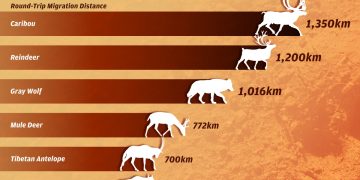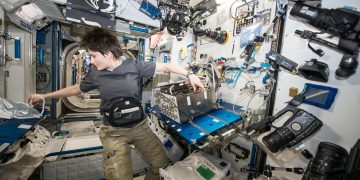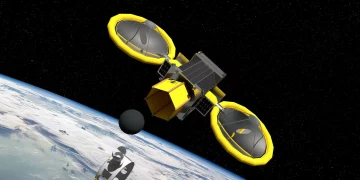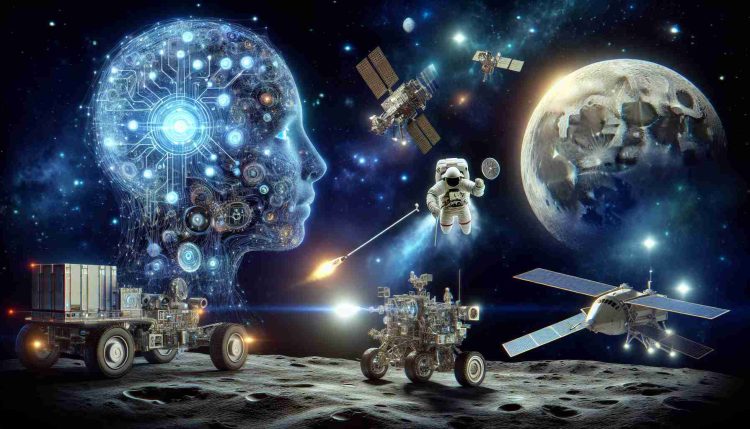Introduction: How AI is Assisting in the Exploration of Outer Space
Space exploration has always been one of humanity’s most ambitious endeavors, stretching the limits of technology, imagination, and endurance. As we push further into the cosmos, the role of Artificial Intelligence (AI) has become increasingly vital. From autonomously navigating spacecraft to analyzing vast amounts of data collected from distant planets, AI is transforming how we explore space, making missions more efficient, cost-effective, and capable of achieving objectives that were once unimaginable.
With the growing complexity of space missions, AI is becoming an essential tool for autonomous operations, real-time decision-making, and data processing. As we enter a new era of space exploration, AI is paving the way for next-generation space exploration technologies that can not only survive the extreme conditions of space but also enhance our understanding of the universe.
In this article, we will explore how AI is shaping the future of space exploration, particularly in mission control, robotics, satellite data analysis, and the various challenges faced when applying AI in such an unpredictable and harsh environment.
AI in Space Missions: Automated Systems for Space Navigation, Research, and Data Collection
One of the most impactful applications of AI in space exploration is in mission control. Traditional space missions relied heavily on real-time human oversight and manual adjustments, but as space exploration becomes more advanced, AI has proven to be invaluable in handling the complexity and scope of modern missions.
AI is used to automate systems aboard spacecraft, improving their ability to navigate, collect data, and carry out experiments without direct human intervention. Autonomous navigation systems, powered by AI algorithms, allow spacecraft to adjust their trajectory and avoid obstacles by analyzing real-time data from sensors and cameras. This is particularly critical in deep-space missions, where communication delays between Earth and spacecraft can last for minutes or even hours.
AI systems are also utilized in the collection and analysis of scientific data gathered during missions. For instance, NASA’s Perseverance Rover on Mars uses AI to identify and select samples for collection, avoiding manual oversight from Earth-based scientists. AI-driven data collection systems are able to process and prioritize information more efficiently, enabling spacecraft to perform complex tasks autonomously, including taking images, conducting experiments, and sending data back to Earth.
Moreover, AI is helping improve the precision and efficiency of spacecraft systems. By learning from past missions and outcomes, AI algorithms continually refine their operations, ensuring that future missions are more successful and cost-efficient.
AI-Powered Robotics: Robots and Rovers Powered by AI to Explore Distant Planets
AI-powered robots and rovers have become an indispensable part of space exploration, allowing for detailed exploration of distant planets and moons that would be difficult or impossible for humans to reach. These AI-driven robots are designed to operate in environments with little to no human interaction, relying on advanced algorithms to make decisions and take action.
The Mars rovers, such as Curiosity and Perseverance, are prime examples of how AI has revolutionized space exploration. These rovers are equipped with AI systems that help them navigate the Martian surface, avoid obstacles, and analyze soil samples. For example, the AI-driven autonomy of Perseverance allows it to identify areas of interest, such as rock formations or unusual soil, and autonomously decide where to focus its research. This autonomous decision-making ensures that the rover can carry out complex tasks, such as drilling and collecting samples, without waiting for instructions from Earth.
In addition to Mars exploration, AI-powered robots are also being used to explore moons like Europa and Titan—places that hold potential for future habitability or scientific discovery. Robots designed for such missions must navigate extreme environments, such as the icy surface of Europa or the thick atmosphere of Titan, with minimal human intervention. AI enables these robots to perform complex tasks such as ice drilling, sampling, and environmental analysis.

AI for Satellite Data Processing: Using AI to Analyze Vast Amounts of Data from Space Missions
Space missions generate an overwhelming amount of data, and one of the critical challenges is efficiently processing and analyzing this data to extract meaningful insights. Satellites, space telescopes, and rovers continuously capture images, spectra, and other data that need to be processed for scientific study. AI, particularly machine learning (ML) algorithms, is playing a central role in helping scientists sift through this vast ocean of data.
In satellite-based observation systems, AI is used to analyze data related to Earth’s climate, atmosphere, and surface changes. AI can detect subtle changes in images that might go unnoticed by human analysts, such as monitoring deforestation, tracking the movement of ice caps, or identifying urban expansion. AI can also be used to monitor natural disasters like hurricanes, wildfires, or volcanic activity, helping to improve forecasting and disaster management.
Another area where AI is making a significant impact is in space telescopes, such as the James Webb Space Telescope (JWST). The JWST will generate huge volumes of data as it studies distant galaxies, black holes, and exoplanets. AI algorithms will be critical in analyzing these datasets, identifying patterns and anomalies, and providing insights into the origins of the universe and the possibility of life beyond Earth.
By automating data processing, AI systems not only reduce the workload for human researchers but also provide more accurate and timely insights, allowing for a faster understanding of complex space phenomena.
Challenges in AI for Space Exploration: Overcoming the Limitations of AI in Extreme Environments
Despite the remarkable advances in AI for space exploration, several challenges remain in applying these technologies in the harsh conditions of space. One of the biggest hurdles is reliability—space missions often span years, and AI systems need to be robust enough to handle unforeseen circumstances. AI systems must be able to function autonomously without human intervention, even when faced with unpredicted situations or failures in components.
The extreme environments of space present additional challenges. Radiation in space can damage electronics, while temperature fluctuations, microgravity, and limited resources all make it harder for AI systems to function. AI must be engineered to survive these hostile conditions and operate efficiently without the same level of support that terrestrial technology receives.
Moreover, AI systems used in space must be self-sufficient and capable of handling unexpected issues without human input. Communication delays between Earth and space vehicles can be substantial, meaning that real-time troubleshooting or support is often impossible. To combat this, AI needs to be designed with advanced decision-making capabilities that allow systems to make crucial decisions independently.
Additionally, developing AI models that can adapt to the vast variety of environments across space—from the surface of Mars to the icy moons of Jupiter—requires innovative engineering and extensive testing. As AI models become more advanced, the integration of resilient and adaptive algorithms will be essential for ensuring success in long-duration space missions.
Conclusion: The Role of AI in Expanding Humanity’s Reach into Space
AI is becoming an integral part of the next wave of space exploration, helping to expand the possibilities for what humanity can achieve in the cosmos. By enhancing mission control, automating space navigation, powering autonomous robots and rovers, and processing enormous amounts of satellite and telescope data, AI is opening new frontiers that will shape the future of space exploration.
In the coming decades, AI will continue to play a critical role in ensuring the success of long-duration missions, such as human expeditions to Mars, as well as in exploring more distant celestial bodies. While challenges remain—particularly in adapting AI to the extreme conditions of space—the potential for AI to help humanity expand its presence in the universe is boundless.
As we push further into the unknown, AI is not just assisting in space exploration; it is making the impossible possible. With AI as a trusted ally, we are closer than ever to realizing the dream of becoming a multi-planetary species, unlocking the mysteries of the universe, and perhaps finding the answers to some of humanity’s most profound questions about life and the cosmos.












































Discussion about this post